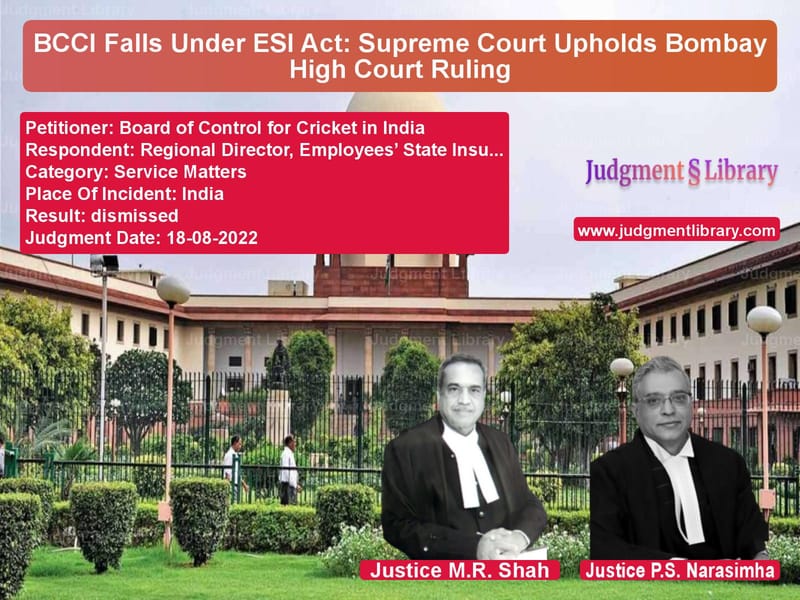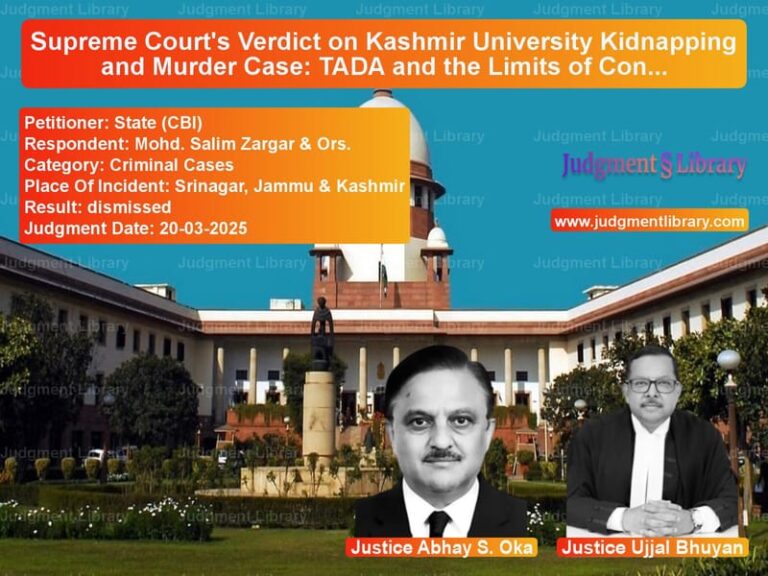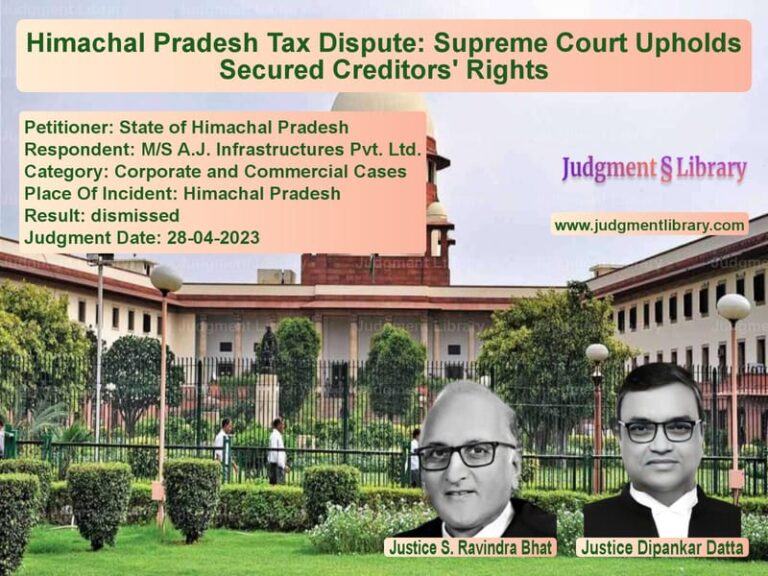BCCI Falls Under ESI Act: Supreme Court Upholds Bombay High Court Ruling
The case of Board of Control for Cricket in India (BCCI) vs. Regional Director, Employees’ State Insurance Corporation and Anr. revolved around the applicability of the Employees’ State Insurance (ESI) Act, 1948, to the Board of Control for Cricket in India (BCCI). The Supreme Court was called upon to decide whether BCCI could be categorized as a ‘shop’ under the ESI Act and whether the provisions of the Act were applicable to it.
Background of the Case
The dispute began when the Regional Director of Employees’ State Insurance Corporation (ESIC) issued a communication on 22.06.2011, declaring that BCCI was covered under the ESI Act from 01.01.2007. The ESIC also issued a notice demanding contributions from BCCI, amounting to Rs. 5,04,075/- for the period from May 2007 to March 2014.
BCCI opposed the demand, arguing that it was not engaged in commercial activities and, therefore, could not be categorized as a ‘shop’ under the ESI Act. It contended that its primary objective was to promote and regulate cricket in India, rather than to conduct business or commercial activities.
After hearing both parties, the Employees’ Insurance Court at Bombay ruled against BCCI and held that it was engaged in commercial activities and fell within the definition of a ‘shop’ as per the notification dated 18.09.1978 issued under Section 1(5) of the ESI Act. This decision was upheld by the Bombay High Court on 24.06.2022, leading BCCI to approach the Supreme Court.
Arguments Presented
Petitioner (BCCI) Arguments
- BCCI contended that it was not a commercial organization but a regulatory body for cricket in India.
- It argued that its revenue was ultimately used to promote cricket and not for profit-making purposes.
- BCCI stated that its activities did not fall under the traditional definition of a ‘shop’ and should not be subjected to the ESI Act.
- The organization relied on the judgments in Secretary, Ministry of Information & Broadcasting, Govt. of India vs. Cricket Association of Bengal (1995) 2 SCC 161 and Commissioner of Sales Tax vs. Sai Publication Fund (2002) 4 SCC 57, to argue that it was not engaged in trade or commerce.
Respondent (ESI Corporation) Arguments
- ESI Corporation argued that BCCI was engaged in systematic commercial activities, including selling tickets for cricket matches, organizing tournaments, and earning revenue from broadcasting rights.
- It relied on BCCI’s Memorandum of Association and financial records to establish that it engaged in activities similar to those of a commercial enterprise.
- The ESI Corporation asserted that the ESI Act was a welfare legislation meant to provide benefits to employees and should be given a liberal interpretation.
- It cited the Supreme Court’s ruling in Bangalore Turf Club Ltd. vs. Regional Director, Employees’ State Insurance Corporation (2014) 9 SCC 657, where the court held that even entities engaged in entertainment and sports activities could be considered as ‘shops’ under the ESI Act.
Supreme Court’s Analysis and Judgment
The Supreme Court examined whether BCCI met the definition of a ‘shop’ under the ESI Act and whether its activities could be classified as commercial in nature.
Key Observations by the Supreme Court
- The Court reiterated that the ESI Act is a welfare legislation aimed at ensuring social security for employees and must be interpreted in a broad manner to achieve its objective.
- It found that BCCI was engaged in systematic commercial activities, including revenue generation through international tours, the Indian Premier League (IPL), ticket sales, and broadcasting rights.
- The Court noted that similar organizations engaged in sports and entertainment, such as the Bangalore Turf Club, had already been brought under the purview of the ESI Act.
- The Court rejected BCCI’s argument that its predominant activity was the promotion of cricket, stating that the nature of its revenue-generating operations indicated a commercial character.
Key Court Statement
“The systematic activities carried out by BCCI, namely, selling tickets for cricket matches, providing entertainment, rendering services for a price, and earning revenue from international tours and IPL, clearly indicate that BCCI is engaged in commercial activities. The ESI Court and the High Court have rightly concluded that BCCI is a ‘shop’ for the purposes of attracting the provisions of the ESI Act.”
Final Judgment
- The Supreme Court dismissed BCCI’s appeal and upheld the decision of the Bombay High Court.
- It ruled that BCCI falls within the definition of a ‘shop’ under the ESI Act and is liable to pay contributions under the Act.
- The Court reaffirmed that welfare legislation must be interpreted liberally to benefit employees and ensure social security.
Implications of the Judgment
The Supreme Court’s ruling has significant implications for sports organizations and other entities engaged in entertainment and commercial activities:
- It establishes that organizations generating revenue from events, ticket sales, and sponsorships can be classified as ‘shops’ under the ESI Act.
- It broadens the scope of the ESI Act to cover organizations beyond traditional businesses and factories.
- The ruling emphasizes the importance of employee welfare and ensures that large organizations like BCCI contribute to the social security of their workers.
Conclusion
The Supreme Court’s decision in this case reaffirms the principle that welfare legislations like the ESI Act must be interpreted in a manner that benefits employees. By classifying BCCI as a ‘shop,’ the Court has underscored that even organizations engaged in sports and entertainment must comply with labor welfare laws if they engage in systematic commercial activities. This judgment serves as a precedent for similar cases where large organizations seek exemptions from social security obligations.
Petitioner Name: Board of Control for Cricket in India.Respondent Name: Regional Director, Employees’ State Insurance Corporation and Anr..Judgment By: Justice M.R. Shah, Justice P.S. Narasimha.Place Of Incident: India.Judgment Date: 18-08-2022.
Don’t miss out on the full details! Download the complete judgment in PDF format below and gain valuable insights instantly!
Download Judgment: board-of-control-for-vs-regional-director,-e-supreme-court-of-india-judgment-dated-18-08-2022.pdf
Directly Download Judgment: Directly download this Judgment
See all petitions in Employment Disputes
See all petitions in Public Sector Employees
See all petitions in Recruitment Policies
See all petitions in Other Cases
See all petitions in Judgment by Mukeshkumar Rasikbhai Shah
See all petitions in Judgment by P.S. Narasimha
See all petitions in dismissed
See all petitions in supreme court of India judgments August 2022
See all petitions in 2022 judgments
See all posts in Service Matters Category
See all allowed petitions in Service Matters Category
See all Dismissed petitions in Service Matters Category
See all partially allowed petitions in Service Matters Category







